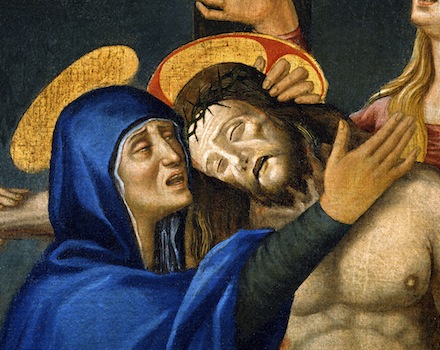As a teacher, one of the most challenging aspects of my job is mollifying a mother who believes that some form of injustice has been inflicted upon her child. Yet whatever the merit of her complaint, there is a lesson to be learned that is far more important than whether or not she can convince me that her child deserves an "A". Only one mother in the history of the world has ever had the right to say that her son was perfect, but don't tell that to the rest of the mothers out there. I say this not as a reproach, but as a way of pointing out that a mother's love is by its nature blind. After all, somebody has to see greatness in us in order for us to see the potential for greatness in ourselves. All the same, idealizing one's child should not be regarded as the end and purpose of motherhood. Even sinless Mary, whose own child was without blemish, had to learn something greater than this. The Latin phrase "Stabat Mater" is translated to mean "the mother stood". But as unimpressive as this phrase may seem, it represents the greatest and most profound lesson that Mary ever had to learn.
Perhaps the last thing that I would associate with a mother is passivity and inactivity. Every woman who is worth being called a woman is the furthest thing from idle. Indeed, her beautiful busy-ness is one of her most attractive features. Who can deny that as a general rule the maternal heart is like a wellspring of generosity and a fountain of charity, rarely taking even a moment to think of herself? If you think I am generalizing too much, just come to one of my classes and see what happens when I ask for a volunteer to do some odd job. By virtue of the enthusiasm with which these young ladies extend their hands, you would think I was offering them a salary in exchange for performing the task. This is a marvel to me as a man, and as I observe such inexplicable generosity, all I can do is take off my hat and bow to such a mystery.
However, the purpose of this post is not simply to boast about women/mothers (though I could all day), but instead to point out another virtue which is far more difficult for women. The vice of a woman is oftentimes the inverse of the vice of a man. Nevertheless, in what sense can it be said that "standing by" the cross, or anything else for that matter, is a virtue? The great temptation of every mother is to remove any and all burdens from her son/child. This is an understandable weakness, but carried to its extreme it can ultimately retard his development. A young boy learns pretty early on if he can manipulate mommy into running interference for him, and though he may resent her for it in the end, he knows full well "where his bread is buttered." Slothfulness tends to be the failing in most men, while gluttony tends to be the vice of every women. I do not mean gluttony in the traditional sense (though it can manifest itself that way), but rather the kind of gluttony which, intended or not, ultimately serves to eclipse the role of a man. I call it the Miss Piggy syndrome (if you like), for if you look at Piggy's relationship with that inept little frog, you learn pretty much everything you need to know about this "syndrome."
My mother-in-law is one of the most generous people I know (not withstanding my own mother), but she has a habit of doing everything for everybody. In fact, at times it becomes a sort of fatalistic self-fulfilling prophesy. "Nobody in the house will help me, so I am doomed to do such and such." On one occasion she even lamented to me that one of her sons wouldn't do his chore; "But that's OK," she said, "because I like to give to my children." Well, for the Marthas of the world, and for those who want their little boys to grow up as they should, sometimes it is actually more important "to receive than it is to give." Let your child serve you, not for your own sake, but for his own. It is great that you yourself know how to give abundantly, but your insufferable generosity is preventing him from learning how to do the same.
The truth is if a mother really wants her little boy to grow up and be a man she must resist the temptation of always trying to wipe away every little tear from his face. Rather than attempting to forestall any and all challenges in his life, she must restrain herself and permit him take up his cross. I know this is the most painful thing a mother will ever have to do, but she must find a way to do so, lest her little boy grow up to be a lazy man-child who sits around with a remote control (clearly a male invention) ignoring his wife, or if it suits him, demanding this or that thing. Don't try to remove his cross from him or you will remove his very potential for salvation (not to mention self-respect). Don't perform his duties for him- tell him to step up and "be a man", otherwise he will shrink away as Adam once did into the bushes of oblivion and narcissism. In the film The Passion of the Christ, this distorted image of a mother and her child is captured in a terrifying fashion. Alongside the original image of mother and child, the movie presents a Satanic mockery of the former ideal (as evil does with everything). Instead of the sweet maternity of Mary, what you get is the dreadful androgyny of Satan. And in place of the sweet innocence of the Christ child, you get two features that no child should ever possess: perversity and corruption.
Thus, if a mother truly wishes for her son to become a man, she cannot take away all his struggles and disappointments. Of course there is nothing wrong whatsoever when a mother chooses to suffer with her child, as Mary once did with Jesus. But what a mother cannot do is allow herself to attempt to take away all the sufferings and sacrifices that are bound to turn her little boy into a man. This was perhaps Mary's greatest suffering in her life, and it is evident at various points in the Gospels, where she is told, in no uncertain terms, that her vocation involves more than simply shielding Jesus from the storms of life. Below is one of the most heartbreaking and beautiful depictions of what it must feel like for a woman to "stand" with her son without trying to remove his cross. Mary's crucifixion was Jesus' crucifixion. In this instance, allowing him to be crucified was a greater act of love and deference than she herself being crucified in his place. Indeed, at this moment it was her gut wrenching vocation to permit her Son to fulfill his terrible destiny, while never ceasing to see him as her precious little child. This is the true passion of Mary and every other mother who has ever loved her child with every inch and fiber of her being.




Indeed a hard lesson for mothers to learn, but one that is needed. mea culpa
ReplyDelete